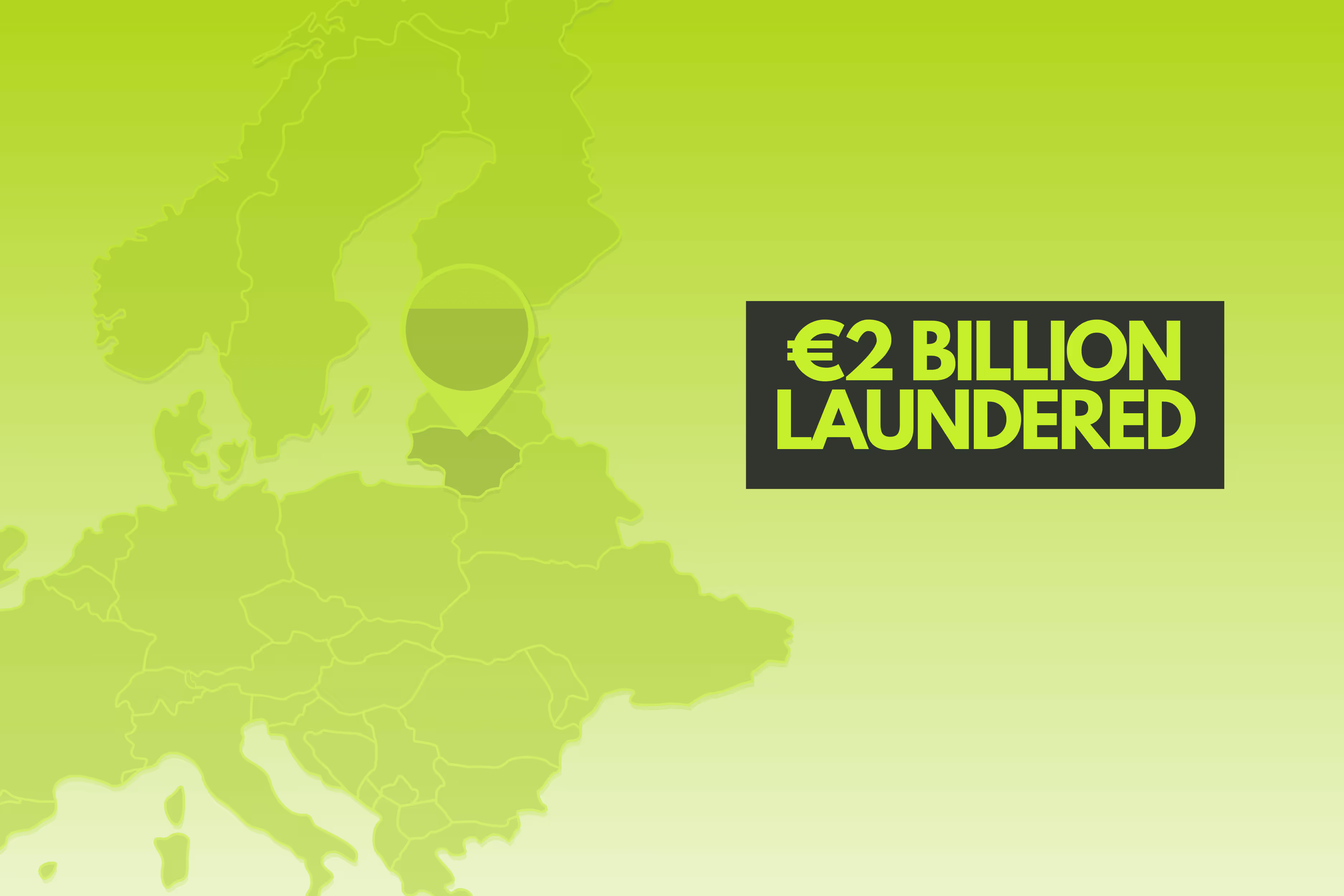
€2B Money Laundering Scandal in Lithuania: AML Insights
In February 2024, investigators shockingly revealed that a Lithuanian financial institution offered "money laundering as a service" to thousands of criminals across the EU. Although this is an active investigation, the case presents numerous valuable insights for AML and compliance professionals.
Lithuanian Money Laundering Scandal: Here's What Happened
On February 27, Eurojust, the European Union Agency for Criminal Justice Cooperation, announced in a news release that 'full-scale action' is in place against a €2 billion money laundering network via a Lithuanian financial institution.
Lithuania joined the European Union in 2004 and adopted the euro on January 1, 2015.
Eurojust did not reveal the name of the accused company. However, they said it was a Lithuanian Electronic Money Institution (EMI). Prosecutors also stated that the EMI operated as a "money laundering as a service" to thousands of criminals across the EU.
During raids on February 27, police in Italy, Latvia, and Lithuania arrested 18 suspects - including the three ringleaders. They also commented that over €11.5 million in assets and bank accounts were frozen.
How Were the Illicit Funds Laundered?
We'll get to where the dirty money came from in a moment. But first, let's examine the modus operandi of the money laundering operation.
According to prosecutors, the money laundering network provided services to thousands of criminals across the EU by advertising its alleged consultancy services online. This operation was established in Lithuania in 2016 by an Organized Crime Group (OCG) based in Italy.
But what happened once they found customers for their illegal services?
The accused Lithuanian financial institution reportedly created fictitious transactions via a web of enterprises and shell companies, which strawmen ran. Prosecutors also said that some of the proceeds were injected into the Latvian and Lithuanian economies by purchasing real estate and luxury vehicles.
An intriguing facet of the case is the role strawmen played in the money laundering operation. Let's delve into that now.
How Strawmen Allegedly Played a Crucial Role in the Operation
Strawmen are individuals used as fronts to conceal the actual beneficiaries or operators of illicit activities, such as money laundering. Criminal organizations around the world, such as Mexican drug cartels, have also been known to utilize similar methods of money laundering through strawmen.
So how does it work?
Although the following is speculation, based on what public information Eurojust released, strawmen were likely used to conceal the actual ownership and control of shell companies and enterprises involved in the Lithuanian financial institution's money laundering scheme.
Here's how they might have been utilized:
Formation of Shell Companies: The criminals likely set up numerous shell companies and enterprises, facilitating financial transactions to launder dirty money.
Appointment of Strawmen: Strawmen were appointed as directors, shareholders, or other positions within these shell companies. These individuals could have been recruited or coerced into participating in the scheme, often without full knowledge of the criminal activities involved.
Anonymity and Plausible Deniability: By using strawmen to carry out transactions, the actual beneficiaries of the money laundering scheme would have remained hidden. This layer of anonymity and plausible deniability potentially made it challenging for European law enforcement agencies to trace the illicit funds back to their source.
Notably, Lithuanian authorities shut down the implicated financial institution in 2022, with the case only surfacing in the public domain in February 2024.
Recommended reading: What Is a Shell Company in Money Laundering? A Key Tool for Criminals
Origins of the Dirty Money
As many of you are aware, the crime that generates the greatest amount of illegal proceeds requiring laundering is fraud. In the 2024 Lithuanian money laundering saga, prosecutors assert that fraudulent activities - such as cyber fraud - were one of the primary sources of the dirty money.
And this makes sense. After all, fraud, especially online, is increasingly being described as a pandemic. But where else did the illicit proceeds come from? According to the Eurojust media release:
- Fake bankruptcy
- Drug trafficking
- Tax evasion
In addition to the crimes above and fraud, €15 million in unlawfully obtained building bonuses was also allegedly laundered, indicating fraudulent activities in obtaining public funds.
"The laundered money included the €15 million from unlawfully obtained so-called building bonuses provided by the Italian national authorities. These bonuses were given for renovation and insulation works and other energy-saving measures of existing buildings," a spokesperson at Eurojust headquarters in the Hague commented.
The main perpetrator of this building bonuses fraud was a tax consultant who arranged bonuses for 72 other individuals who were also aware of the crime.
Lithuanian Money Laundering Scandal: Final Thoughts
The Lithuanian €2 billion money laundering investigation currently rocking Lithuania, Latvia, and Italy is a stark reminder of the critical importance of robust anti-money laundering (AML) compliance measures.
In light of this case, organizations must prioritize implementing effective AML protocols to prevent similar incidents in the future. One of the best ways for companies to mitigate money laundering risk and comply with regulations is to adopt AML screening technology.
sanctions.io is a highly reliable and cost-effective solution for AML screening. AI-powered and with an enterprise-grade API with 99.99% uptime are reasons why customers globally trust us with their AML screening needs. To learn more about how our sanctions, PEP, and criminal watchlist screening service can support your organization's compliance program:
We also encourage you to take advantage of our free 7-day trial (no credit card is required).



